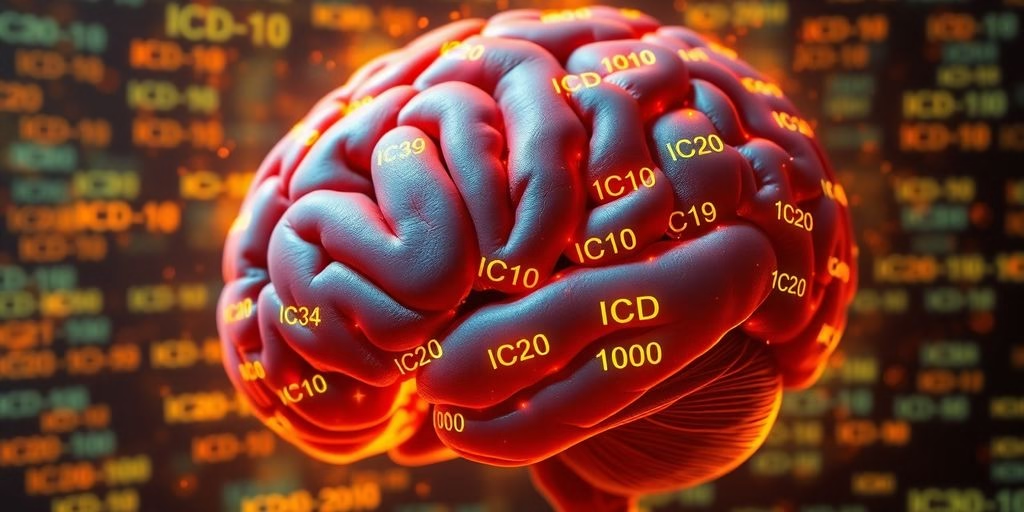For anyone dealing with Attention Deficit Hyperactivity Disorder (ADHD), understanding the codes used in medical records is pretty important. These codes, known as ICD-10 codes, help doctors and healthcare providers talk about diagnoses in a standard way. This article breaks down what you need to know about icd 10 adhd codes, why they matter, and how they are used in everyday practice. It’s about making sure everyone is on the same page when it comes to care.
Key Takeaways
- ICD-10 codes provide a standard way to identify and classify medical conditions, including ADHD.
- Different subtypes of ADHD have specific ICD-10 codes, allowing for more precise diagnosis and record-keeping.
- Accurate use of icd 10 adhd codes is vital for billing, insurance claims, and tracking patient treatment progress.
Understanding ADHD ICD-10 Codes

When it comes to mental health, getting the right diagnosis is super important. For conditions like Attention Deficit Hyperactivity Disorder (ADHD), this means using specific codes to describe the diagnosis accurately. These codes are part of a larger system called the International Classification of Diseases, Tenth Revision, or ICD-10. Think of it as a standardized way for healthcare providers, like those at Polished Mind Psychiatry, to talk about and record health conditions. Using the correct ICD-10 codes helps make sure everyone involved in a patient’s care is on the same page. It also plays a big role in how medical services are billed and tracked. If you’re in Texas, Washington, California, Iowa, or New York and need to understand more about ADHD diagnoses or treatment, it’s a good idea to talk to a professional. You can book an appointment at Polished Mind Psychiatry
The Importance of Accurate Diagnosis
Getting a precise diagnosis for ADHD is more than just a label; it’s the foundation for effective treatment. Without the right diagnosis, a person might receive treatments that don’t address their specific needs, which can be frustrating and unproductive. For example, someone with predominantly inattentive ADHD might be treated differently than someone with the combined type. Accurate coding ensures that the patient receives the most appropriate care. It also helps researchers track the prevalence of different conditions and the effectiveness of various treatments across populations. This detailed information is vital for improving mental health services nationwide.
Navigating the ICD-10 System
The ICD-10 system is a complex but organized way to classify diseases and health problems. For ADHD, there are specific codes that break down the condition into different types. This level of detail is what allows for precise record-keeping and communication within the healthcare field. Understanding these codes helps patients and providers alike.
- F90.0: This code is used for ADHD, predominantly inattentive type. It’s often what people think of as ADD. This type mainly involves difficulties with focus, organization, and forgetfulness. F90.0 for ADD
- F90.1: This code covers ADHD, predominantly hyperactive-impulsive type. Individuals with this type often show a lot of physical restlessness and may act without thinking. hyperkinetic disorders
- F90.2: This is for ADHD, combined type. People with this diagnosis experience significant symptoms of both inattention and hyperactivity-impulsivity.
- F90.8: This code is for other specified ADHD. It’s used when a person has ADHD but doesn’t fit neatly into the other categories.
- F90.9: This is the code for unspecified ADHD. It’s used when the specific type isn’t documented or determined.
The ICD-10 system provides a structured way to categorize health conditions, which is essential for consistent data collection and analysis in healthcare. For mental health professionals, correctly applying these codes is a key part of their practice.
Knowing these codes helps in understanding the specific challenges someone might be facing with ADHD. It’s a detailed system that supports better patient care and research. If you’re looking for ADHD treatment, understanding the diagnostic codes is a good first step.
Specific ICD-10 Codes for ADHD
When it comes to documenting Attention Deficit Hyperactivity Disorder (ADHD), using the correct ICD-10 codes is really important. These codes help healthcare providers in Texas, Washington, California, Iowa, and New York accurately describe a patient’s condition for medical records, billing, and insurance purposes. Polished Mind Psychiatry understands how vital this is for patient care.
Attention Deficit Hyperactivity Disorder, Combined Type
The most common presentation of ADHD is the combined type, where individuals experience significant symptoms of both inattention and hyperactivity-impulsivity. The specific ICD-10 code used to classify this is F90.2. This code is used when a patient meets the criteria for both the inattentive and hyperactive-impulsive subtypes. It’s a key code for billing and insurance claims related to this presentation of ADHD. For more details on ADHD presentations, you can check out ADHD Treatment.
Attention Deficit Hyperactivity Disorder, Predominantly Inattentive Type
For individuals whose primary struggles involve inattention – such as difficulty focusing, organizing tasks, and following instructions – the code is F90.0. This subtype often means a person might seem forgetful, easily distracted, or have trouble completing tasks without losing track. It’s important to use this code accurately to reflect the specific challenges the patient faces. Understanding these specific codes helps in getting the right support.
Attention Deficit Hyperactivity Disorder, Predominantly Hyperactive-Impulsive Type
When hyperactivity and impulsivity are the main symptoms, the ICD-10 code is F90.1. This presentation typically involves restlessness, fidgeting, difficulty staying seated, excessive talking, and acting without thinking. Accurate coding here helps in tracking the specific needs of patients presenting with these symptoms. It’s a clear way to document this particular manifestation of ADHD.
Attention Deficit Hyperactivity Disorder, Unspecified Type
Sometimes, a detailed subtype might not be immediately clear, or the documentation might not specify it. In these cases, the code F90.9 is used for Attention-deficit hyperactivity disorder, unspecified type. This code is a catch-all when the specific presentation isn’t documented or determined. It’s still a valid code for general ADHD diagnosis, but it’s often best to use a more specific code when possible for clearer patient records. If you’re looking for professional assessment and diagnosis, consider booking an appointment.
It’s important for healthcare providers to stay updated on any changes or revisions to ICD-10 codes, as these updates can affect how conditions are documented and billed. Accurate coding is a cornerstone of good medical practice.
Using ICD-10 Codes in Clinical Practice

Billing and Insurance
Using the correct ICD-10 codes is really important for how clinics handle billing and insurance claims. When a doctor or therapist sees a patient for ADHD, they need to pick the right code to describe the diagnosis. This code tells the insurance company what kind of service was provided. For example, if someone has ADHD with both inattentive and hyperactive symptoms, the code F90.2 would be used. If the symptoms are mainly inattentive, then F90.0 is the code. For cases where the specific type isn’t clear, F90.9 is used. Getting these codes right helps make sure the clinic gets paid for their work and avoids problems with insurance. It’s a key part of running a practice smoothly, especially for places like Polished Mind Psychiatry, which serves patients in Texas, Washington, California, Iowa, and New York. If you’re looking for help with ADHD or other mental health concerns, you can book an appointment.
Tracking Patient Progress
Beyond just billing, ICD-10 codes also help track how patients are doing over time. By using specific codes for different types of ADHD, clinicians can see patterns in their patient population. This can help them understand which treatments are working best for different presentations of ADHD. For instance, if a clinic notices many patients with ADHD, combined type, are showing improvement with a certain therapy, they can continue to use that approach. It also helps in research, like studies looking into how ADHD medications affect outcomes, such as self-harm [a1cb]. Accurate coding allows for better data collection, which can lead to improved care strategies for everyone. It’s a way to measure progress and make sure patients are getting the support they need.
Accurate coding is not just about paperwork; it’s about effective patient care and practice management.
Here’s a quick look at how codes are used:
- Diagnosis Specificity: Using codes like F90.0 for inattentive type or F90.2 for combined type helps detail the patient’s condition.
- Insurance Claims: Correct codes are necessary for submitting claims and getting reimbursed.
- Data Analysis: Codes allow for tracking trends and evaluating treatment effectiveness.
- Research: Standardized codes are vital for studies on ADHD and its treatments [c493].
If you or someone you know needs support for ADHD or other mental health conditions, reaching out is the first step. Polished Mind Psychiatry is here to help. You can book an appointment to discuss your needs.
Understanding how to use ICD-10 codes in your daily work is super important for doctors and nurses. These codes help tell the story of a patient’s health issue. Want to learn more about how we can help you with your medical coding needs? Visit our website today!
Wrapping Up Our Look at ADHD ICD-10 Codes
So, we’ve gone through what those ICD-10 codes for ADHD actually mean. It’s a lot of numbers and letters, but they’re how doctors and insurance companies talk about the condition. Knowing them can help you understand your diagnosis better and how it’s recorded. If you’re looking for support or treatment for ADHD, remember that Polished Mind Psychiatry offers personalized care. They’re licensed in several states and have great reviews, so you know you’re in good hands. You can easily book an appointment online to see if they’re a good fit for you. It’s always a good idea to get professional help when you need it.
Frequently Asked Questions
What are ICD-10 codes for ADHD?
ICD-10 codes are like special labels used by doctors and healthcare providers to describe a person’s health condition or diagnosis. For ADHD, these codes help everyone understand exactly what type of ADHD is being treated. This is important for keeping good records and making sure the right care is given.
Are there different ICD-10 codes for different types of ADHD?
There are different codes for the various ways ADHD can show up. For example, some people have trouble focusing (inattentive type), while others are more restless and impulsive (hyperactive-impulsive type). Some people experience a mix of both (combined type). There’s also a code for when the type isn’t clearly one or the other (unspecified type).
Why is it important to use the right ICD-10 code for ADHD?
Yes, using the correct ICD-10 code is crucial for a few reasons. It helps ensure that medical records accurately reflect a patient’s diagnosis, which is vital for their ongoing treatment. It’s also necessary for billing purposes, so insurance companies know what services were provided. Plus, it helps track how patients are doing over time.




